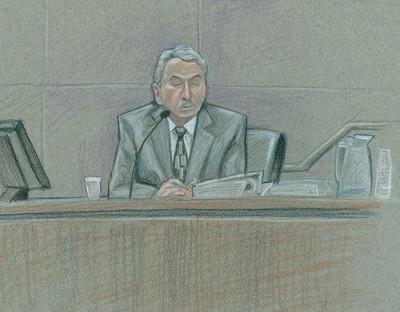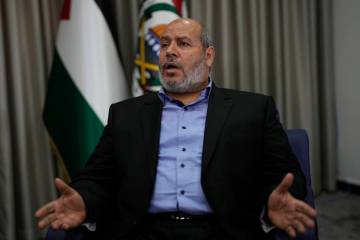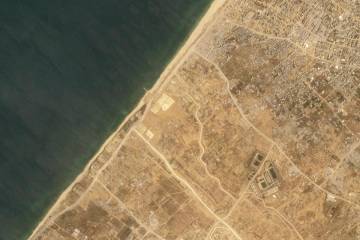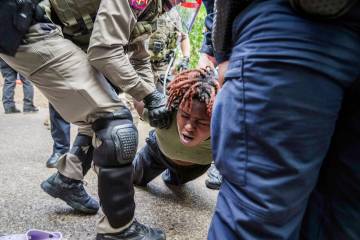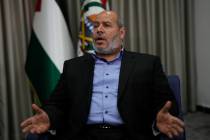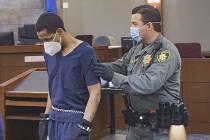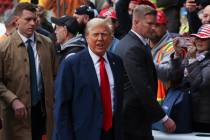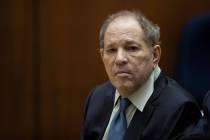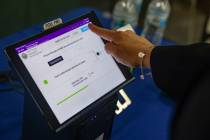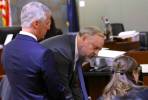Davidson takes the stand, denies paying off Kenny
On the witness stand Thursday, real estate consultant Donald Davidson recalled the day in 2005 when federal agents visited him armed with a recording of what they claimed was a phone conversation between former Clark County Commissioner Erin Kenny and her father.
"They played the tape for me," Davidson explained to jurors during his corruption trial. "I remember her saying she was going to be coming into a lot of money."
Davidson added that Kenny then said, "I have to go see Don Davidson."
The defense team later learned that the tape was manufactured by the government and Kenny, who signed a plea deal and began cooperating with the prosecution in 2003. The man Davidson believed to be Kenny's father was actually an FBI agent, according to court documents.
When asked what he said to the FBI agents who had played him the tape, Davidson responded emphatically that he told them: "I had nothing to do with giving her money."
The government conceded it had concocted and played the tape for Davidson with hopes he would confess.
"Law enforcement is entitled to use deception in furtherance of law enforcement strategies," Assistant U.S. Attorney Daniel Schiess noted in a court document filed in June in connection with the case.
Davidson, 73, reiterated Thursday that he had nothing to do with the $200,000 paid to Kenny after she helped guide through a zoning change that paved the way for a CVS Pharmacy at the corner of Buffalo Drive and Desert Inn Drive.
Kenny and her accountant, Daniel Geiger, have each testified that the money was later hidden in an off-shore trust established by Davidson's son, Lawrence Davidson.
Donald Davidson said he knew nothing of an illicit trust stowed away in the Cook Islands.
He also denied government contentions that he delivered to Kenny $3,000 a month for nearly three years after she overrode her constituents' strong objections in another case when she voted in favor of a neighborhood casino.
Davidson confidently answered questions his attorney asked about the government's allegations.
He broke into tears once, when he explained that he first came to Las Vegas in 1995 because of a bingo scandal at his Jewish temple in his native Akron, Ohio.
He and his wife decided to celebrate the Jewish holiday in Las Vegas after the scandal erupted in the temple his family helped start. Davidson said he was not involved in the ordeal. That visit 12 years ago led to the Davidsons' move to the valley.
Davidson was indicted in 2005 on charges that he paid Kenny $200,000 for her assistance with securing a zoning change and special use permit critical to a pending $1.5 million deal with CVS in 2001.
Davidson said he was given a 15 percent interest in the land, which amounted to $300,000. But, he said, he never received any success fees.
"Two hundred thousand dollars is a lot of money to anybody, especially me," Davidson said.
He testified that the first time he heard of the $200,000 was when he studied the government's evidence against him, "when I heard Mr. Fehrman told the government I was to receive ... a success fee, I think he called it."
In 2001, real estate agents searching for new sites for CVS pharmacies contacted Davidson, who had met a representative of the drug store chain at a campaign fundraiser. He said he met with Kenny about the project because during negotiations and planning, the property was in her district.
He shuttled ever-changing site plans to the commissioner and discussed land broker Tommy Fehrman's options, he said. Davidson also served as a contact for CVS representatives because of their earlier introduction at the fundraiser.
Davidson testified he was never aware of any money changing hands illegally.
Davidson said he first met Kenny in 1998 when she was running for re-election. She came by the offices of Triple Five Development Corp., where Davidson served as vice president of property management.
"She was a very personable young lady," Davidson said. "She was a nice, sociable, friendly person. She told us about her, and we told her about us."
His relationship with Kenny and other commissioners developed further in 1999, when he was attempting to assemble a 145-acre parcel at Flamingo Road and Grand Canyon Drive where Triple Five planned to build a shopping center. Davidson frequented the Clark County Government Center to comb records there to identify landowners in the area.
"They all knew me. They all knew what I did, and they were very accommodating," Davidson said of the commissioners.
He also mingled with elected officials at political events and fundraisers. Eskander Ghermezian, owner of Triple Five Development, assigned Davidson to represent the company at such events.
Davidson testified that in the spring of 1999, commissioners Yvonne Atkinson Gates, Bruce Woodbury and Myrna Williams visited the Triple Five office to learn more about the shopping center project. Davidson said he personally escorted Kenny and commissioners Dario Herrera and Lance Malone to the proposed site.
It was that year, Davidson said, that Boyd Gaming expressed interest in building a casino on 20 acres of Triple Five's property, Davidson said. Attorney Mark Fiorentino furnished Davidson with a copy of the site plan and "almost carried the ball from that point on," Davidson said.
When defense attorney Dominic Gentile asked whether Davidson made any promises to pay commissioners for their vote or pay them in the future, Davidson forcefully responded: "No, sir."
Kenny testified last week that about April 2000, three months after the commission approved the casino project, she went to work for Triple Five and created brochures. She was paid $3,000 a month, even though she only worked about three hours a month, she said.
Kenny said she became sick that summer and stopped working, but the payments kept coming.
Davidson said he delivered between "$2,000 and $3,000" to Kenny for each month she worked, but he never slipped it to her in an envelope as she contended. He didn't say exactly how he made the payments.
He said the company stopped paying the commissioner when she was too ill to work. She was only paid twice, Davidson said.
Davidson acknowledged that he paid $1,000 to Mark Kincaid, the son of former Clark County Commissioner Mary Kincaid-Chauncey, on two occasions. Davidson said he compensated Kincaid for speaking to his mother and Commissioner Williams about proposed projects in Kenny's district.
Davidson testified that Kenny asked him to communicate with her fellow commissioners because she had a poor relationship with them. Davidson said when he was too busy to handle it himself, he called on Kincaid.
Davidson defended himself from the government's allegations that he used portions of success fees he received from other developers to pay off Kenny.
Developer John Hui testified early in the trial that he paid Davidson $25,000 on March 19, 2001, for Davidson's work on a zoning matter at Fort Apache Road and Maule Avenue.
On March 22, 2001, a day after commissioners approved Hui's zone change, Davidson withdrew $10,000 from his bank account. The government contends he used the cash to pay Kenny for pushing through the zoning change.
Davidson said Thursday that he needed the cash because he planned to bet on and travel to the NCAA men's Final Four basketball championship game.
"I bet on the game and I went to the game," Davidson said.
Davidson said that he referred to Hui as "Chinaman" but said he did not recall using that nickname in front of Kenny. Kenny testified last year that Davidson delivered to her $20,000 from a man she knew only as "Chinaman."
Davidson was not cross-examined by prosecutors Thursday. He is to return to the witness stand this morning.



